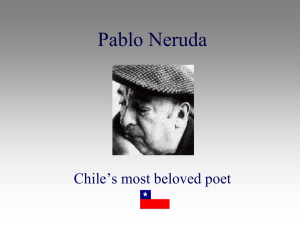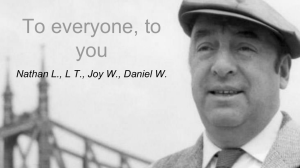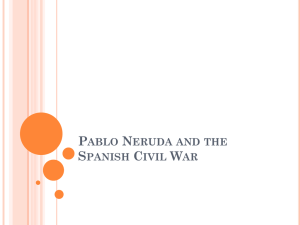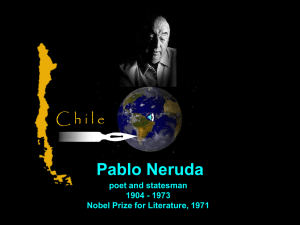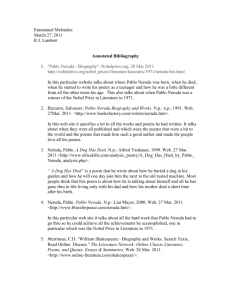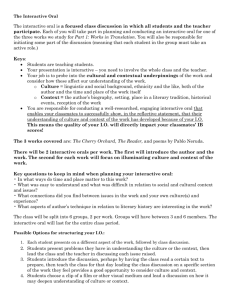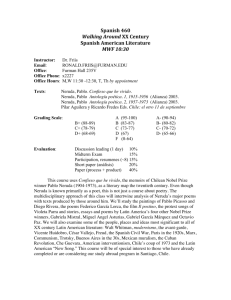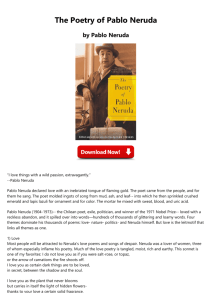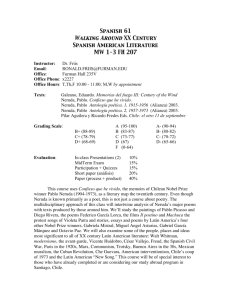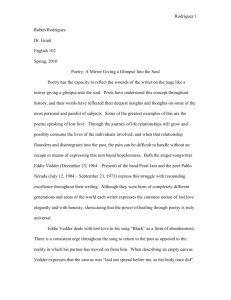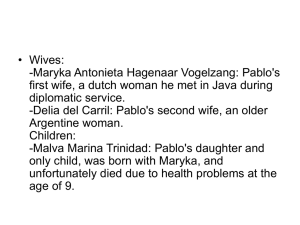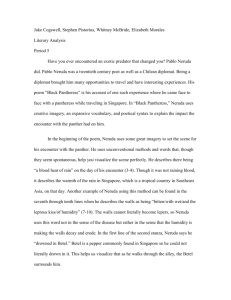The political and social transformation of Pablo Neruda
advertisement
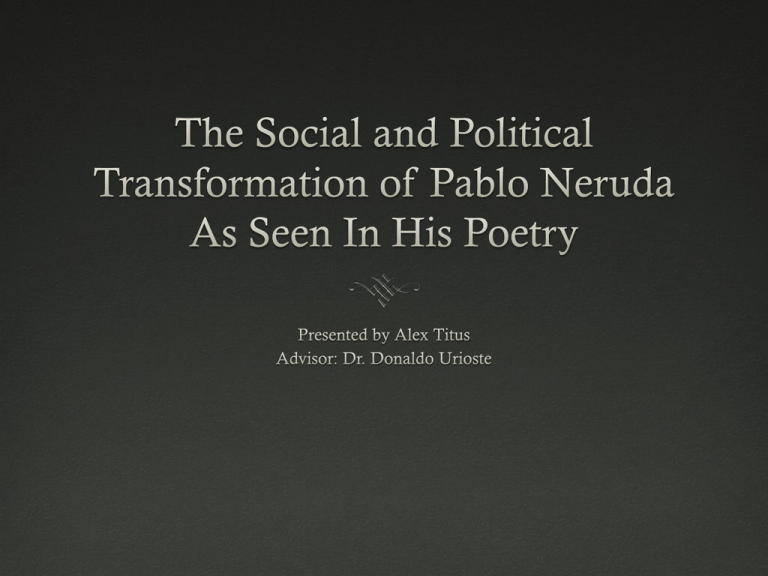
Agenda Purpose Bio of Pablo Neruda Personal Connection Literary Analysis Pre-Spanish Civil War Post-Spanish Civil War Later Years Overview and Questions Purpose The purpose of my capstone is to analyze and connect the poetry of Pablo Neruda to the historical events that surrounded his life. Chronology 1904 – Born Ricardo Eliecer Naftalí March 1921 – Moved to Santiago 1923 – Crepusculario appeared 1924 – 20 Poems of Love and a Song of Despair published 1927 – Named consul of Rangoon 1932 – Returns to Chile from time in the Orient 1934 – Moves to Barcelona, named Consul. 1936 – Spanish Civil War initiates, Neruda starts writing poems for Spain in our Hearts 1940 – Returns to Chile 1945 – Joined the Communist Party and elected Senator for the provinces of Tarapacá and Antofagasta 1948 – Chilean Supreme Court approves the impeachment of Neruda as Senator 1950 – First publish of Canto General made in Mexico 1952 – Returns to Chile from exile 1970 – Neruda’s efforts pay off as Allende wins presidency. 1971 – Granted the Nobel Prize of Literature September 11, 1973 – President Salvador Allende killed in the military coup d'état September 23, 1973 – Pablo Neruda died Personal Connection While studying in Chile I visited all three of Neruda’s houses, and I took a Chilean poetry class. Before leaving to Chile, my older brother gifted me a book of Pablo Neruda’s. Literary analysis Pre Spanish Civil War Post Spanish Civil War Later Years Crepusculario Third Residence Elemental Odes 20 love poems and a song of despair Canto General Estravagario Residence I y II The Grapes and the Memorial of Isla Wind Negra “The social message is bitter and pessimistic… a bleak vision of the future. No solution is offered for injustice and misery.” (pg. 2) -Salvatore Bizzarro Crepusculario “Barrio sin luz” / “Neighborhood Without Light” The poetry of the things goes away or it isn’t able to condense my life? Yesterday- watching the last twilightI was a patch of moss among some ruins. The cities – soot and revengesthe gray filth of the suburbs, the office which hunches the backs, the boss of turbulent eyes. Blood of a red sky over the hills blood on the streets and the squares, pain of broken hearts, pus of loathings and of tears. … And here I am, sprouted up among the ruins, biting only all the sorrows, as if the crying was a seed and I the sole furrow of the earth. 20 Poems of Love and a Song of Despair” … Pale blind diver, luckless slinger, lost discoverer, in you everything sank! It is the hour of departure, the hard cold hour which the night fastens to all the timetables. The rustling belt of the sea girdles the shore. Cold stars heave up, black birds migrate. Deserted like the wharves at dawn. Only the tremulous shadow twists in my hands. Oh farther than everything. Oh farther than everything. It is the hour of departure. Oh abandoned one. Although love is the main focus, he ends the book with despair. The female body is idolized, exotic images are compared with nature. For example, white hills for the body of a woman. Residence on Earth I (1925-31) and II (1931-35) • Unity • Burial in the East • Only Death The poems from these two books were written during Neruda’s time as consul of Chile in the Orient. These times were very lonely for him, and he explains his anguish from solitude in these poems. Residence on Earth I y II “Unity” There is something dense, united, seated in the depths, / repeating its number, its identical sign. / How clear is it that the stones have touched time, / in their fine substance there is a smell of age / and the water that the sea brings from salt and sleep. “Only Death” Death is in the folding cots: / In the slow mattresses, in the black blankets / she lives stretched out, and she suddenly blows: / she blows a dark sound that swells the sheets, / and there are beds sailing to a port / where she is waiting, dressed as an admiral. Spanish Civil War The war started in 1936, when Neruda was Consul of Chile in Spain. For Pablo the war started with the death of one of his best friends, the great poet Gabriel García Lorca. Due to the brutality he witnessed, Neruda sided with the Republic against the Fascists. From his early stages of despair and solitude within the masses, this turning point pushes Neruda toward hope for the future by banning together and finds that misery loves company. Third Residence (1935-1945) • The Furies and the Sorrows • Meeting Under New Flags • Spain in Our Hearts • “I Explain a Few Things” • “Battle of the Jarama River” • “Solar Ode to the Town’s Army” “Battle of the Jarama River” Between the earth and the drowned platinum of olive orchards and Spanish dead, Jarama, pure dagger, you have resisted the wave of the cruel. … He shows us his support for the people, the small towns, and the Republic against the fascists in Spain. The bitter wheat of your people was all bristling with metal and bones, formidable and germinal like the noble land that they defended Furthermore, Neruda shows his support of a violent revolution; a common characteristic of the communistic ideology. Neruda’s Forced Exile As Senator of two northern provinces in Chile, Neruda openly spoke and published articles in support of the copper and nitrate miners. He called out and embarrassed the President at the time, Gabriel González Videla. Videla sent out for his arrest, and Pablo fled into exile while finishing his book Canto General. Neruda’s political ideologies lead him to this exile, and a propagandist tone is found in Canto General without taking away from his poetic artistry. I. The Lamp on Earth II. Heights of Machu Picchu III. The Conquerors IV. The Liberators V. The Betrayed Sand VI. America, I don’t invoke your name in vain VII. General Song of Chile VIII. The Land Called Juan IX. Awaken the Woodcutter X. The Fugitive XI. The flowers of Punitaqui XII. Rivers of Song XIII. Coral New Year for the Homeland in Darkness XIV. The Great Ocean XV. I Am Canto General (1938-1949) With Chile as the main inspiration, Neruda gives a clear view on how he would like to see the South American continent. All of the previous events he witnessed up to this point influenced his ideology, and it is seen in the social and political themes. X. The Fugitive XIII. “American Sand, Solemn” I don’t feel alone at night, in earth’s darkness. I am the people, innumerable peoples. … Death , martyrdom, shadows, ice, suddenly cover the seed. And the town seems buried. But the corn returns to the earth … From death we are born. Later Years • Elemental Odes • Memorial of Isla Negra After a long road of solidarity through his adolescence, The horrific events he lived through in Spain, and his hectic life in politics, his later years brought a search of a more simple life; the poetry of Neruda also finds simpler tones. Elemental Odes “Ode to Socks” Mara Mori brought me a pair of socks … Violent socks, my feet were two fish made of wool, two long sharks sea blue, shot through by one golden thread, … my feet were honoured in this way by these heavenly socks. … I resisted the mad impulse to put them in a golden cage and each day give them birdseed and pieces of pink melon. … The moral of my ode is this: beauty is twice beauty and what is good is doubly good when it is a matter of two socks made of wool in winter. Overview Early Life Struggles Spanish Civil War Conflicts with Chile His simpler form Nobel Prize of Literature, 1971 Questions? Thank you!
